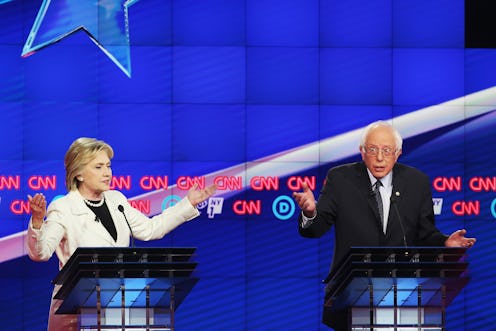News
The Precedent Clinton Set In 2008
Considering the lead former Secretary of State, Hillary Clinton, holds over Senator Bernie Sanders — and the expectation that Clinton will enlarge this lead on 'Acela Tuesday' — there is a lot of talk about Sanders dropping out of the race for the Democratic nomination. However, —to Clinton's certain dismay— it's unlikely that Sanders will drop out anytime soon, and it may be in part due to a precedent for dropping out that Clinton herself followed in 2008.
Hillary Clinton ceded to now President Barack Obama on June 7, 2008 — four days after Obama reached the delegate count needed to clinch the nomination in the final two Democratic primaries (Montana and North Dakota). Although the lead Obama had over Clinton in 2008 was considerably smaller than Clinton's significant lead over Sanders in the 2016 primary cycle, it had been clear for a while before Clinton ended her campaign that Obama would win the Democratic nomination in 2008.
The New York Times recently reported that Democratic candidates have a history of not dropping out until the end of the primary season, and Clinton certainly followed this precedent when she stayed in the race until after the last primary in 2008.
Understandably, Sanders doesn't seem to be particularly inclined to dropping out yet, either — presumably he wants to spread his political message while he has the chance, and the large audience. It's likely that Sanders will not drop out until the California primary on June 7 — even though the AP reports that Clinton could win the nomination before California votes.
Due to the likelihood of her candidacy, and her wish to start campaigning solely against the Republicans, Clinton is clearly ready for Sanders to drop out of the race. In fact, after her win in New York, Clinton reached out to Sanders supporters, saying, "To all the people who supported Senator Sanders, I believe there is much more that unites us than divides us."
A party divide definitely concerns Clinton — assuming she wins the Democratic nomination, Clinton must have Sanders' supporters on her side in order to beat her Republican opponent in the November general election. Therefore, many Democrats are urging Sanders to endorse Clinton, and encourage his supporter to vote for Clinton in November.
This is where the precedent Clinton set with her 2008 campaign should help rather than hurt her 2016 campaign. In a Monday night MSNBC town hall, moderated by Rachel Maddow, Clinton explained that Sanders should work to unite the Democratic party — just as she did in 2008:
I didn't say, 'You know what, if Senator Obama does x, y and z, maybe I'll support him.' I said, 'I am supporting Senator Obama, because no matter what our differences might be, they pale in comparison to the differences between us and the Republicans.' So from the time I withdrew, until the time I nominated him – I nominated him at the Convention in Denver – I spent an enormous amount of time convincing my supporters to support him. That is what I think one does. That is certainly what I did and I hope that we will see the same this year.
However, it does not seem as if Sanders is ready to comply and cede the race to Clinton, nor does he necessarily expect his supporters to back Clinton — even if he, Sanders, does so himself. During his MSNBC town hall, which aired Monday night, Sanders responded to an audience member's question as to whether or not he will support Clinton and unify the party:
You know, we are not a movement where I can snap my fingers and say to you or to anybody else what you should do, because you won't listen to me. You shouldn't. You'll make these decisions yourself.
Clearly Sanders is not ready to follow Clinton's precedent yet; however, he did promise MSNBC moderator Chris Hayes:
I will do everything in my power to make sure that no Republican gets into the White House in this election cycle.
That's what Clinton did in 2008 — though just as with Sanders, it took her a while to cede to, and get behind, her opponent. If Clinton had dropped out of the race sooner in 2008 maybe Sanders would be more compelled to drop out of the 2016 primary cycle, but she didn't and it doesn't seem as if Sanders will, either.
